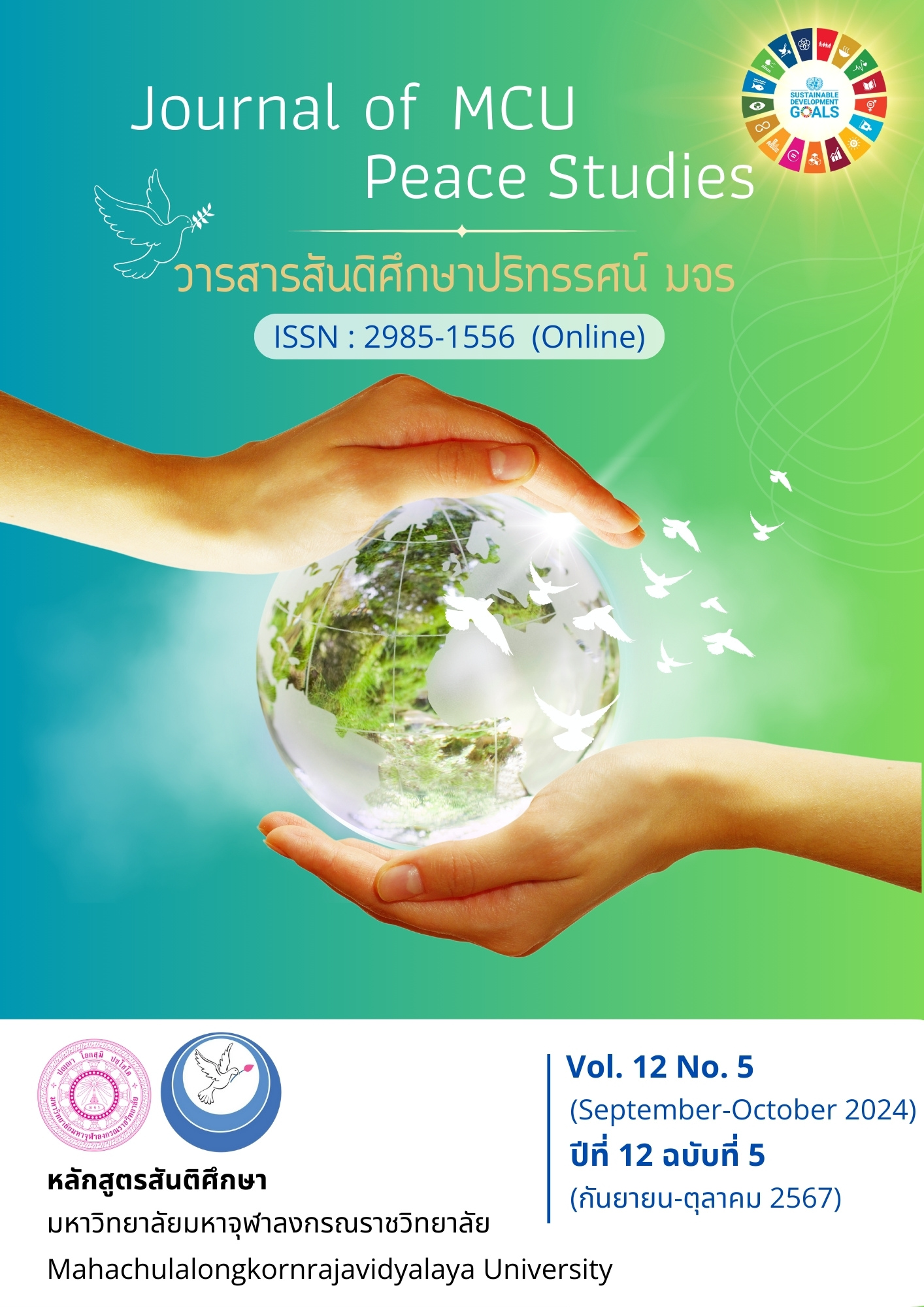รูปแบบการพัฒนาภาวะผู้นำเชิงนวัตกรรมสู่คุณภาพการศึกษายุคประเทศไทย 4.0 ของผู้บริหารสถานศึกษา สังกัดสำนักงานเขตพื้นที่การศึกษามัธยมศึกษากาฬสินธุ์
Main Article Content
บทคัดย่อ
วิจัยและพัฒนานี้มีวัตถุประสงค์เพื่อ 1) ศึกษาสภาพปัจจุบัน สภาพที่พึงประสงค์ของภาวะผู้นำเชิงนวัตกรรมสู่คุณภาพการศึกษายุคประเทศไทย 4.0 ของผู้บริหารสถานศึกษา สังกัดสำนักงานเขตพื้นที่การศึกษามัธยมศึกษากาฬสินธุ์ กลุ่มผู้ให้ข้อมูล ได้แก่ ผู้ทรงคุณวุฒิ จำนวน 9 คน เลือกแบบเจาะจง กลุ่มตัวอย่าง ได้แก่ ผู้บริหารสถานศึกษา จำนวน 160 คน โดยการสุ่มแบบแบ่งชั้น และจากผู้บริหารสถานศึกษาที่มีวิธีปฏิบัติที่ดี จำนวน 3 คน เลือกแบบเจาะจง 2) สร้างและตรวจสอบรูปแบบ กลุ่มผู้ให้ข้อมูล ได้แก่ ผู้ทรงคุณวุฒิ จำนวน 7 คน เลือกแบบเจาะจง 3) ทดลองใช้รูปแบบ กลุ่มผู้ให้ข้อมูล ได้แก่ ผู้บริหารสถานศึกษา จำนวน 8 คน โดยสมัครใจ และ 4) ประเมินประสิทธิภาพของรูปแบบ กลุ่มผู้ให้ข้อมูล ได้แก่ ผู้บริหารสถานศึกษา จำนวน 8 คน เลือกแบบเจาะจง เครื่องมือที่ใช้ในการวิจัย ได้แก่ 1) แบบประเมินองค์ประกอบ 2) แบบสอบถามสภาพปัจจุบันมีค่าความเชื่อมั่น เท่ากับ 0.93 มีค่าอำนาจจำแนกรายข้อ อยู่ระหว่าง 0.55-0.85 แบบสอบถามสภาพที่พึงประสงค์มีความเชื่อมั่น เท่ากับ 0.95 มีค่าอำนาจจำแนกรายข้อ อยู่ระหว่าง 0.51-0.88 3) แบบสัมภาษณ์ 4) แบบทดสอบ 5) แบบสอบถามระดับพฤติกรรม 6) แบบสอบถามประสิทธิภาพ และ 7) แบบสอบถามความพึงพอใจ สถิติที่ใช้ในการวิจัย ได้แก่ ร้อยละ ค่าเฉลี่ย ส่วนเบี่ยงเบนมาตรฐาน และค่าความต้องการจำเป็น
ผลการวิจัยพบว่า 1) สภาพปัจจุบันอยู่ในระดับมาก และสภาพที่พึงประสงค์อยู่ในระดับมากที่สุด ลำดับความต้องการจำเป็นลำดับที่ 1 คือ ด้านการมีวิสัยทัศน์เชิงนวัตกรรม 2) รูปแบบ ประกอบด้วย 5 ส่วน (1) หลักการและวัตถุประสงค์ของรูปแบบ (2) สาระสำคัญของรูปแบบ (3) วิธีพัฒนาของรูปแบบ (4) การประเมินผลรูปแบบ และ (5) เงื่อนไขความสำเร็จ มีความเหมาะสมและความเป็นไปได้อยู่ในระดับมากที่สุด
3) คะแนนประเมินความรู้หลังการพัฒนาสูงกว่าคะแนนก่อนการพัฒนา ระดับพฤติกรรมหลังการพัฒนาสูงกว่าก่อนการพัฒนา คะแนนจำแนกตามระดับการประเมิน อยู่ในระดับมากที่สุด และ 4) ประสิทธิภาพด้านความถูกต้องและความเป็นประโยชน์อยู่ในระดับมากที่สุดและระดับความพึงพอใจอยู่ในระดับมากที่สุด
Article Details

อนุญาตภายใต้เงื่อนไข Creative Commons Attribution-NonCommercial-NoDerivatives 4.0 International License.
ทัศนะและความคิดเห็นที่ปรากฏในบทความในวารสาร ถือเป็นความรับผิดชอบของผู้เขียนบทความนั้น และไม่ถือเป็นทัศนะและความรับผิดชอบของกองบรรณาธิการ ยินยอมว่าบทความเป็นลิขสิทธิ์ของวารสาร
เอกสารอ้างอิง
Ahmed, P. K. (1998). Culture and Climate for Innovation. European Journal of Innovation Management, 1(1), 30-43.
Alharbi, I. B. A. (2021). Innovative Leadership: A Literature Review Paper. Open Journal of Leadership, 10, 214-229.
Asio, J. M. R., & Bayucca, S. A. (2021). Spearheading Education During the COVID-19 Rife: Administrators’ Level of Digital Competence and Schools’ Readiness on Distance Learning. Journal of Pedagogical Sociology and Psychology, 3(1), 19-26.
Borwonchaidet, R. (2017). The Developing Program to Enhance the Effective School Leadership for the School Principals under Provincial Administrative Organization. (Doctoral Dissertation). Mahasarakham University. Mahasarakham.
De Jong, J. P. J., & Den Hartog, D. N. (2007). How Leaders Influence Employees' Innovative Behaviour. European Journal of Innovation Management, 10(1), 41-64.
Haseesuk, S. (2022). Model of Teaching Management on the Concept of Understanding, Connecting, Develop for Banmuangkae School under the Buriram Primary Educational Service Area Office 4. Journal of Social Innovation and Mass Communication Technology, 5(2), 1-10.
Higgins, J. M. (1995). Innovate or Evaporate: Test & Improve Your Organization’s IQ-Its Innovation Quotient. New York: New Management Publishing Company.
Krejcie, R. V., & Morgan, D. W. (1970). Determining Sample Size for Research Activities. Educational and Psychological Measurement, 30(3), 607-610.
Lindegaard, S. (2009). The Open Innovation Revolution: Essentials, Roadblocks and Leadership Skills. New Jersey: Wiley.
Marquardt, M. J. (2002). Building the Learning Organization. New York: McGraw-Hill.
McMillan, J. H., & Schumacher, S. (2001). Research in Education: A Conceptual Introduction. (5th ed.). New York: Longman.
Ministry of Education. (2016). Educational Development Plan of the Ministry of Education No. 12 (2017 - 2021). Bangkok: Office of the Permanent Secretary, Ministry of Education.
Moonsrikaew, N. (2020). Developing a Program to Strengthen Innovative Leadership of Secondary School Administrators under the Office of Basic Education Commission. (Doctoral Dissertation). Mahasarakham University. Mahasarakham.
Neuman, M., & Simmons, W. (2000). Leadership for Student Learning. Phi Delta Kappan, 82(1), 9-12.
Office of the National Economic and Social Development Board. (2017). National Economic and Social Development Plan No. 12. Bangkok: Office of the National Economic and Social Development Board.
Patel, E. (2012). The Essentials of School Leadership. London: Paul Chapman.
Pawabutra, Ch., Dungchatom, S., & Hansuri S. (2020). Technological Leadership Development Model for the School Administrators in the Digital Age. Journal of Educational Administration and Leadership, 9(33), 1-11.
Pongsri, S. (2019). The Effectiveness Supervision Model in Thai Instruction of Private Primary School in The Northeastern Part of Thailand. (Doctoral Dissertation). Mahasarakham University. Mahasarakham.
Runcharoen, T. (2014). Professionalism in Organizing and Managing Education During the Second Round of Education Reform and the Third Round of External Evaluation. (8th ed.). Bangkok: Khao Fang.
Srisa-ard, B. (2017). Preliminary Research. (10th ed.). Bangkok: Suviriyasan.
The Secondary Educational Service Area Office Kalasin. (2022). Annual Action Plan for Fiscal Year 2022 (B.E. 2565). Kalasin: Secondary Educational Service Area Office Kalasin.
Wannasee, J. (2021). Educational Management in the Digital Era. Phitsanulok: Rattanasuwan Printing 3.
Yusuf, H. (2019). Education Management in the Age of Digitality and Social Media: Exploring the Utilization of Digitality and Social Media to Improve the Management of Further Education from a Methodological Perspective. (Master’s Thesis). The University of Boston. USA.


